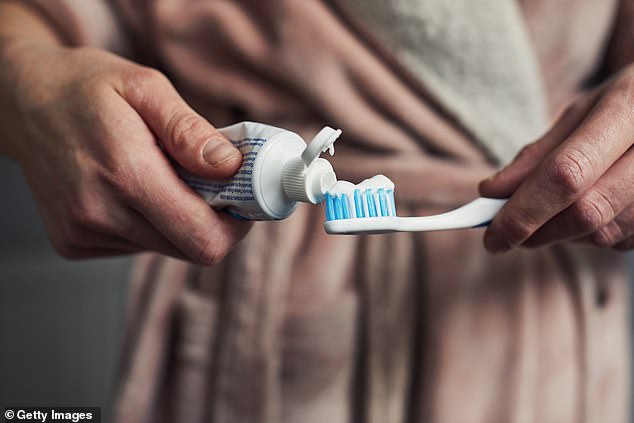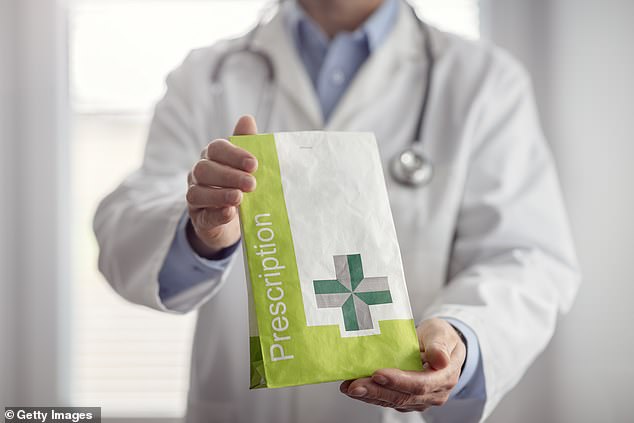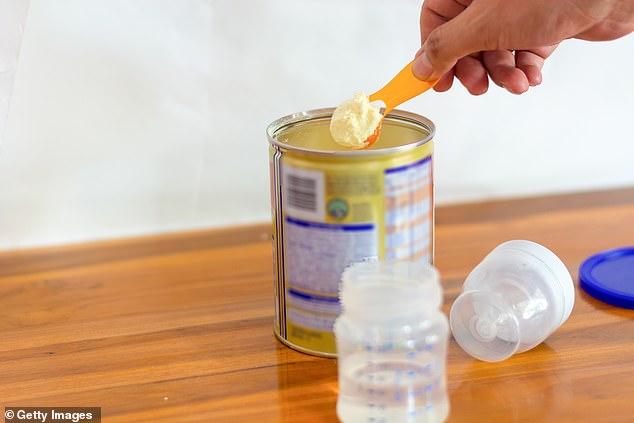Doctors defy NHS rules by prescribing over-the-counter items such as shampoo and vitamins to patients who struggle to afford them
Doctors are increasingly defying NHS rules by prescribing over-the-counter items such as baby food, shampoo, toothpaste and multivitamins to patients who struggle to afford basic goods.
Official NHS data shows that the number of prescriptions written by GPs in England for these everyday products has increased by up to 80 per cent in two years.
It is a reversal of a trend that has seen levels gradually fall since 2018, when GPs were warned not to ‘waste’ NHS resources on everyday items sold in shops and supermarkets.
Now GPs say they must take action to protect their ‘most vulnerable’ patients from the impact of the cost of living.
Although the official NHS guidance clearly states that over-the-counter products such as standard multivitamin tablets, non-medicated anti-dandruff shampoo and regular infant formula should not be prescribed, doctors have the discretion to override this if they feel this is necessary.
Professor Kamila Hawthorne, president of the Royal College of GPs, said GPs would not prescribe medicines without ‘a good reason’ and that doctors took into account all aspects of a patient’s health, including ‘physical, psychological and social factors’.
There was a 16 per cent increase in GP prescriptions for everyday multivitamin tablets for adults from over-the-counter brands including Boots, Superdrug and Tesco in two years. The number of prescriptions written increased from approximately 151,600 in 2021/22 to 175,000 in 2023/24.
These figures apply only to standard multivitamins that can be purchased in stores and do not include special formulations for children or specific medical conditions, such as kidney failure.
The number of prescriptions written by GPs in England for these everyday products has increased by up to 80 percent in two years (stock image)

These recipes were for everyday ‘household and over-the-counter’ items including Colgate Total toothpaste, Ambre Solaire after-sun lotion and Neutrogena and Aveeno shampoos (stock image)

GPs say they must take action to protect their ‘most vulnerable’ patients from the cost of living impact (stock image)
Health chiefs have warned GPs not to prescribe vitamins except in specific cases of deficiencies or malnutrition.
NHS England states that most supplements can be bought cheaply without a prescription and that ‘most people can and should get vitamins by eating a healthy, varied and balanced diet’. But the number of people struggling to afford food is increasing, with food bank Trussell Trust reporting a 94 per cent increase in the use of its emergency food parcels in the past five years.
There was also a four per cent increase in the number of prescriptions for over-the-counter toiletries issued by GPs over the past two years, from around 270,600 in 2021/22 to almost 282,000 in 2023/24.
These prescriptions were for everyday ‘household and over-the-counter’ items, including Colgate Total toothpaste, Ambre Solaire after-sun lotion and Neutrogena and Aveeno shampoos – not special medicated prescription products, which are recorded separately.
And prescriptions for standard brands of baby food, including SMA Little Steps and Aptamil 1, have risen by 80 per cent in two years and by a third in the past year alone – despite clear guidance stating that NHS chiefs do not ‘approve’ these. recipes.
The figures do not include special formulas for specific conditions or dietary requirements, which may be prescribed.
In 2021/2022, doctors issued 201 prescriptions for standard formula – a small number that reflects how rare it was for standard infant formula to be prescribed as medicine. But by 2023/34 the number of annual prescriptions had risen to 362.
The strong increase was probably caused by the sharply rising sales price of baby food. According to the watchdog Competition and Markets Authority (CMA), costs have risen by 25 percent in the two years to the end of 2023. Next month (FEB) it is expected to release its report on whether there has been profiteering by the formula industry.

Prescriptions for standard baby food brands, including SMA Little Steps and Aptamil 1, have increased by 80 percent in two years and by a third in the past year alone (stock image)

Nine out of ten prescriptions dispensed in England are provided for free – although 40 percent of the population are required to pay for their prescriptions (stock image)
Professor Hawthorne added: ‘The most vulnerable in society are obviously the most affected (by the cost of living crisis), and GPs are witnessing how higher prices are impacting the health of our patients every day in our surgeries.
‘We recognize that prescription costs are significant to the NHS, and GPs will always encourage patients to purchase over-the-counter items where appropriate and safe. But…some patients need them for medical reasons, and some, especially during this cost-of-living crisis, are struggling to afford them (or are unable to).”
Although prescription data does not reveal whether or not patients pay for prescriptions, it is likely that GPs will only issue a prescription if the patient does not pay for their prescription, or if the item would be significantly more expensive. without a prescription than the standard prescription cost of £9.65.
Nine out of 10 prescriptions given in England are provided for free – although 40 per cent of the population are required to pay for their prescriptions – government figures show. Those exempt from payment include children under 16 (or under 18 in full-time education), adults over 60 and people receiving certain benefits or tax breaks, including those on Universal Credit whose income falls below a certain threshold.
NHS chiefs updated their prescribing guidelines in November to reiterate that vitamins and toiletries should not be prescribed except in circumstances where doctors felt ‘the patient’s ability to care for themselves is compromised due to the medical, mental health or significant social vulnerability, to the extent that their ability to care for themselves is affected. health and/or well-being could be negatively affected”.
An NHS spokesperson said: ‘GPs are expert medical professionals and use their knowledge to prescribe treatments that keep patients healthy and prevent further ill health. The NHS is one of the most efficient healthcare services in the world and GPs are acutely aware of how much prescriptions cost the NHS, and will always encourage patients to buy ‘over the counter’ products.’
